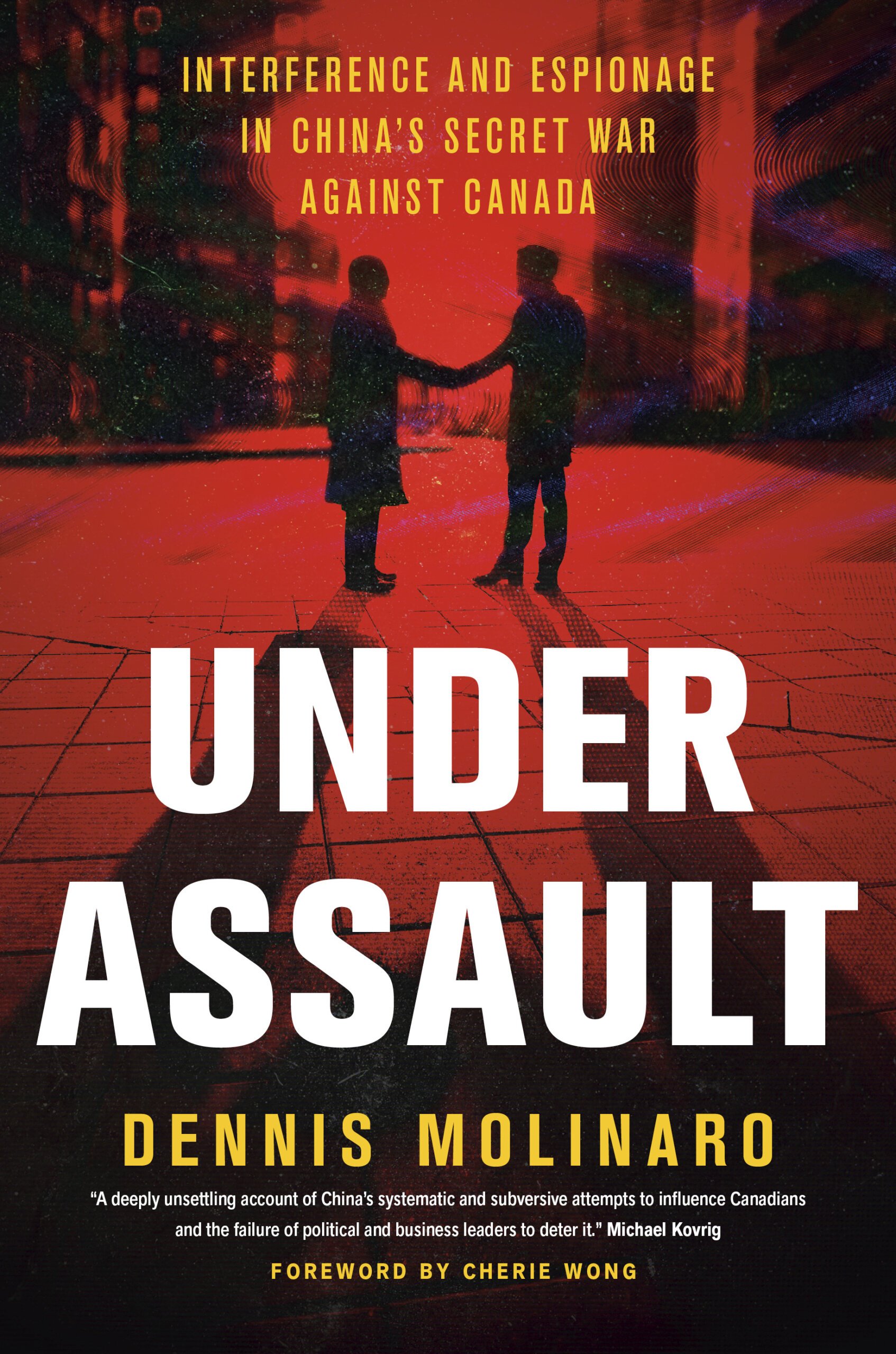
Dennis Molinaro’s latest book explores Chinese interference in Canada. [Penguin Random House Canada]
The western world has been focused on the threat of terrorism for the past two decades and for good reason. The post-9/11 “war on terror” sought to combat and end a substantial peril to the West and prevent more large-scale attacks. It succeeded on several fronts, although the threat could never be completely eliminated. But when it came to the West’s interactions with nation-states such as the People’s Republic of China (PRC), they have been governed by a specific delusion for half a century. Canada, like the U.S., believed that if it did business with China, extended a hand of friendship, China would transform itself into a liberal-democratic country. Trade would lead to freedom. But Canada was wrong. Beijing never considered joining a liberal order and instead used Canada as a backdoor to the U.S. and as a means of exploiting resources and technology.
But more Canadians and Americans are coming to terms with the harsh realities they have ignored for too long. The stories of secret PRC police stations in the news a little more than a year ago weren’t a new phenomenon. The PRC had been interfering and seeking to influence the political and civic life in Canada for decades. And Canadian leaders have done little to deter adversaries from operating here.
But how did such a situation arise? To date, Canadians have had diplomatic histories of the Canada-China relationship but an intelligence history wasn’t incorporated into them. That’s necessary if Canada hopes to have a realistic appraisal and understanding of the relationship.
In October 1970, Prime Minister Pierre Trudeau recognized the People’s Republic of China. Canadians incorporated the event into the narrative of Canada as peacemakers who brought an isolated country into the global fold. The truth is colder. Canada was useful. China was searching for a means to influence the U.S. into recognizing it and Canada served as an in. Chinese leader Mao Zedong didn’t view Canada as a friend in the western sense. He viewed it as a means of breaking the American containment policy. When Canada recognized Beijing, it abandoned Taiwan and accepted terms that its allies rejected. Canada thought it was leading the world. In truth, it was being led.
The problem with the Canada-China relationship from this point forward was that self-deception became ingrained and the standard operating procedure for Canadian governments. The China that Canada’s leaders saw and engaged with was one they invented in their own minds. They saw a potential market for wheat and potash. They saw a counterweight to the U.S. They convinced themselves that economic liberalization would inevitably lead to political freedom. They weren’t alone in this thinking, even the U.S. adopted it, though its defences against Beijing were more developed than Canada’s.
But the truth was that the Chinese Communist Party (CCP) used western openness to build its economy and modernize its military. They used western universities to train their scientists. The West dreamed of partnership while China planned for dominance.

Dennis Molinaro is a former national security analyst and policy advisor for the federal government [The Documentarians/Courtesy Penguin Random House Canada]
The consequences of this naïveté are more visible in the ruins of Nortel Networks. In 2000, Nortel was a Canadian success story, a titan that dominated the global fiber-optic transmission market. Just one decade later, it was bankrupt. Many factors contributed to its fall, but corporate espionage was a fatal wound. Hackers compromised the company’s networks for years. They stole trade secrets and technical papers that served as road maps for future technology. They stole the passwords of executives and had free reign in their networks. The hacking was traced back to China. While Nortel collapsed, Chinese tech giants rose to global prominence.
Similar thefts continue today. The thievery moved from corporate boardrooms to Canada’s most sensitive laboratories. The case of the National Microbiology Laboratory in Winnipeg stands as a notable example of carelessness. The facility is designed to handle the world’s deadliest pathogens. Yet Canada allowed scientists with ties to individuals connected to the PRC military to work there. Ignorant of the security threats, Canada allowed the transfer of deadly virus samples to China’s Wuhan Institute of Virology.
The regime in Beijing operates on a concept of transnational sovereignty. It believes anyone of Chinese descent, regardless of their citizenship, owes their loyalty to China. By this logic, it doesn’t respect Canada’s borders as it hunts its critics in Canada. It harasses the Uyghur community, Tibetans, the Falun Gong, and Hong Kong pro-democracy activists and Taiwan independence supporters. It uses threats against family members back home to silence dissidents in places such as Vancouver and Toronto.
This is transnational repression. It’s a foreign state enforcing its political will on Canadian soil. When activists such as Chemi Lhamo run for student office in Canada, they face thousands of death threats. When Uyghur rights advocates such as Mehmet Tohti speak out, they are followed by strangers and receive ominous phone calls. and threats to their families in China. This isn’t community infighting. It’s a foreign government outsourcing terror to silence its enemies in Canada.
The United Front Work Department is an arm of the Chinese Communist Party tasked with influencing foreign elites and controlling the PRC diaspora abroad. Its goal is to make foreign decision-makers sympathetic to Beijing’s interests, and it cultivates relationships with influential figures at all levels from school boards to Parliament. In return, it expects support for China’s interests and silence on its indiscretions. During the April 2024 Hogue inquiry into foreign interference, the Canadian Security Intelligence Service reported that it believed China interfered in the 2019 and 2021 federal elections.
The government’s response to these revelations has been sluggish with a promised foreign agent registry yet to materialize. Canada can’t afford this approach any longer. The world has changed. The era of optimistic engagement is over. China isn’t a partner. It’s an adversary that seeks to reshape the international order. It supports Russia’s war in Ukraine. It threatens Taiwan. It spies on Canada’s allies. It steals technology. It interferes in democracy.
Canada needs a profound shift in how it views national security. It needs to enforce the laws it has and fund its military and its intelligence services so they can do their jobs. It needs to better protect its research and its critical infrastructure.
Most importantly, Canada needs to stop seeing the China it wants to see and start seeing the China that is. It must recognize that it’s in a conflict that the other side has been fighting in secret for 50 years.
Canada is currently seeking a re-engagement with China due to U.S. tariffs, but that shouldn’t come at further expense to Canada’s economic security and threats to its democratic institutions, its sovereignty and its people. Any new relationship must first recognize that Canada has been under assault.
Costs must be imposed on people secretly working for foreign states in Canada. Canada needs to protect its democratic institutions and processes. Canada can engage with China, but it must demonstrate it won’t accept being bullied and that foreign influence and interference won’t be tolerated.
All of this is possible and achievable when Canada stops looking for friends and starts defending its interests.
Advertisement





















